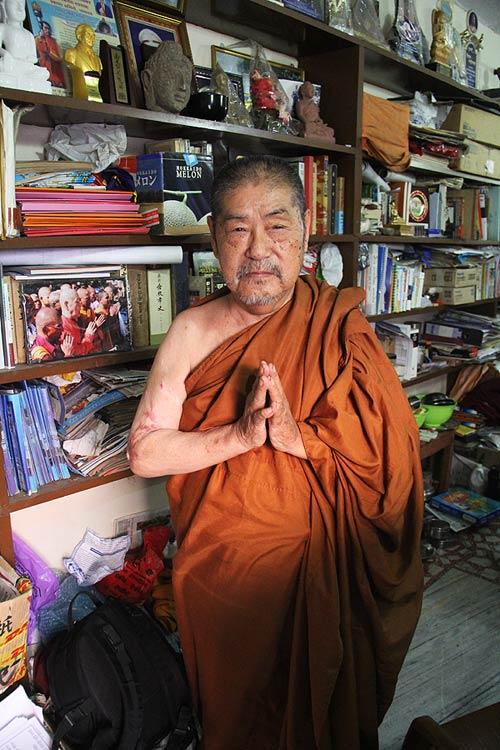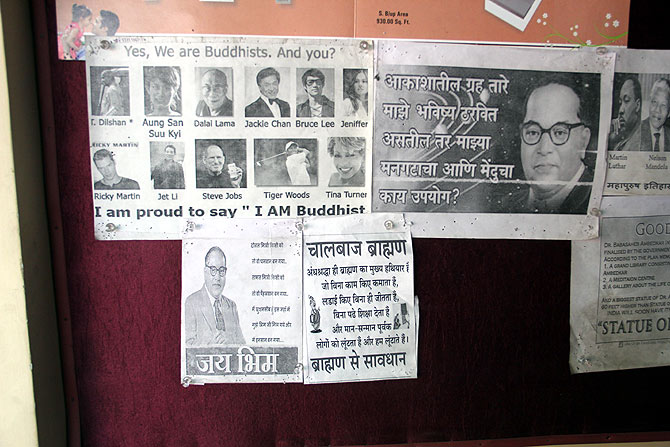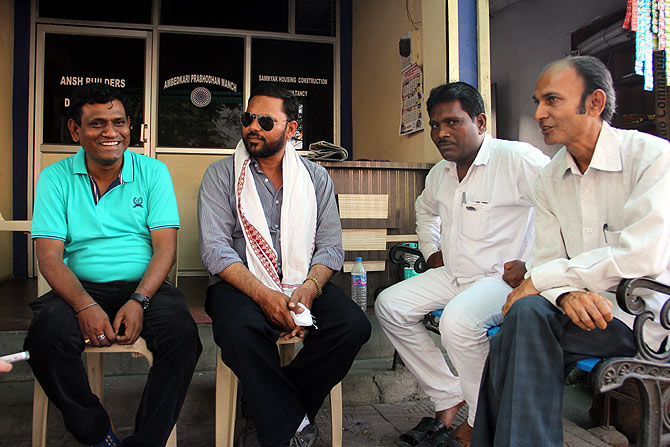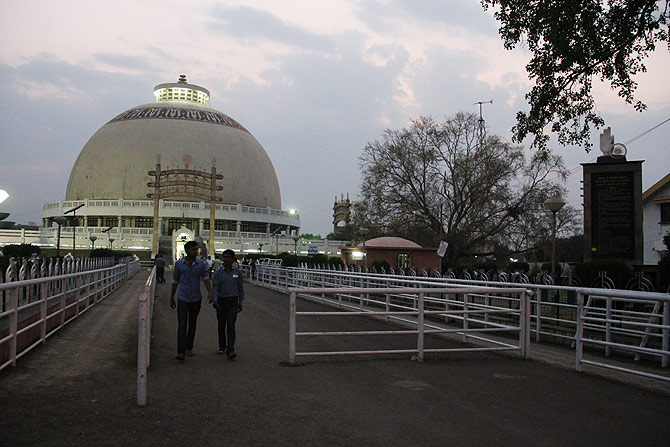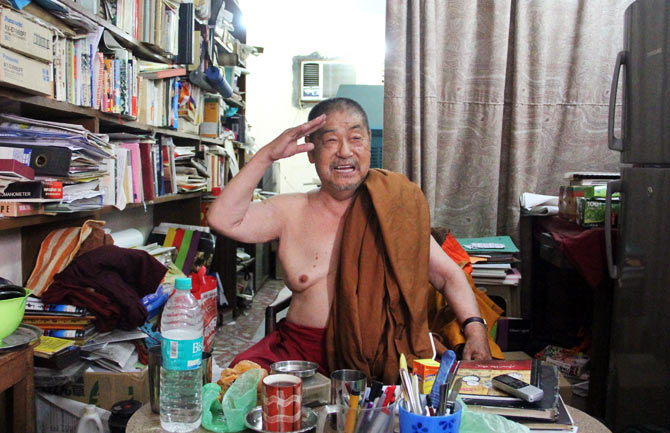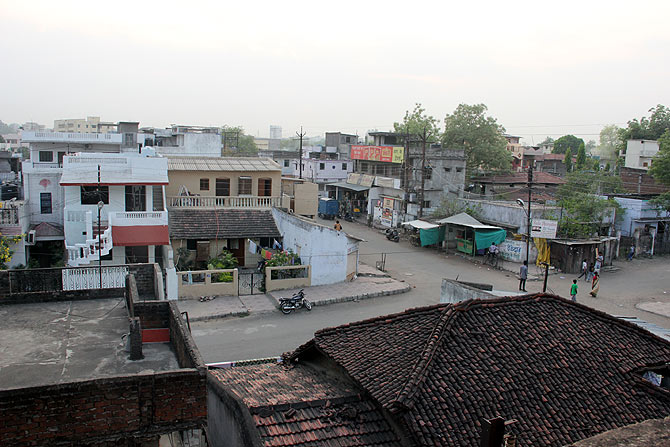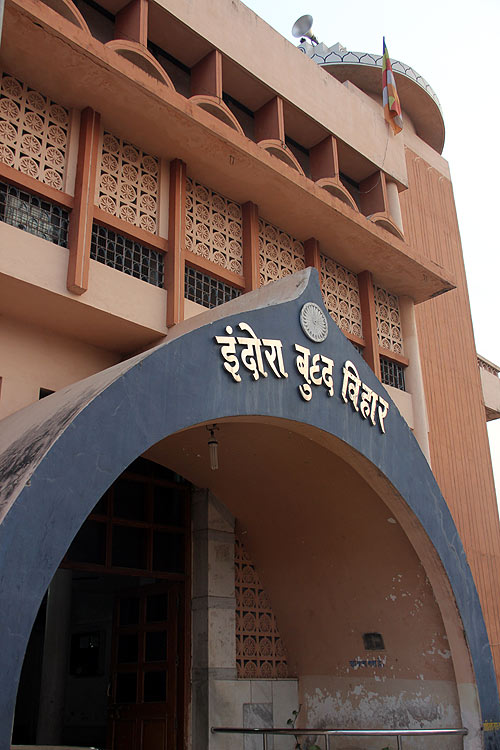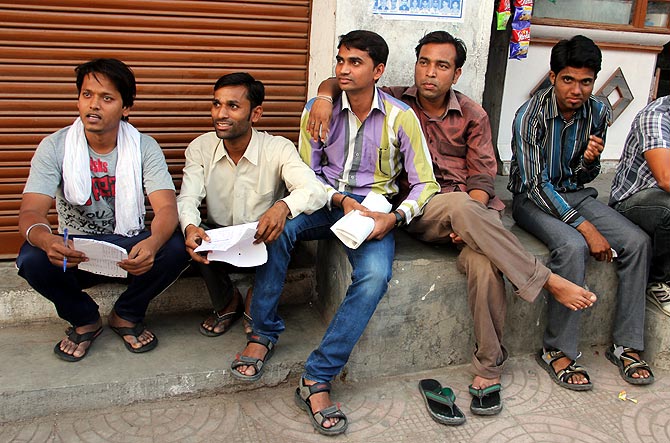 | « Back to article | Print this article |
The Japanese monk who is against the BJP
'If they come to power, they will try to change the Constitution. They are destroying Babasaheb's name. They are fundamentalist people,' says Surai Sasai, the Buddhist monk who has issued an edict that Nagpur's Buddhists not vote for the BJP or its candidate Nitin Gadkari.
The Buddhist areas in Nagpur, Rediff.com's Vaihayasi Pande Daniel discovers, have a special identity and a firm thinking of its own. Additional reportage and Photographs: Uttam Ghosh/Rediff.com
The Buddhists of Indora, north Nagpur, do not want Narendra Modi.
Nor will they vote for any candidate put up by the Bharatiya Janata Party, or with links to the Rashtriya Swayamsevak Sangh.
Indora is a significantly Buddhist area -- according to the locals it is about 60 percent Buddhist. This unusual-looking neighbourhood, along with a few others (Kamptee, Sitabuldi), contribute to the city's 25 percent and Maharashtra's 5.83 million Buddhist population (as per the 2001 Census figures).
Indora has a flavour somewhat different from the rest of Nagpur or urban Maharashtra. Viharas (some 25 monasteries), stupa-style buildings with pale blue domes, toranas (gateways), dharmachakras, and bare-chested monks, swathed in orange or maroon robes, roaming about, instantly give you a sense of the area's strong Buddhist leanings.
As does the predominance of the colour blue.
Nagpur was where Dr Babasaheb Ambedkar, shunning Hinduism's caste injustices, took deeksha to become a Buddhist in a public ceremony, along with his wife Savita (nee Dr Sharada Kabir), and 500,000 followers in October 1956.
The deekshabhoomi, where Dr Ambedkar became a Buddhist, is sacred to the community and thousands more conversions followed, bringing an unexpected 20th century surge in Buddhism in India.
Since the 1950s, Nagpur has attracted a population of neo-Buddhist Dalits. Many made Indora their home. This vast area -- Chota Indora and Naya Indora -- evolved from a miserable, garbage-ridden slum, where no one wanted to go/live, to the more prosperous, well-laid out neighbourhood it is today with sturdy houses, wide streets, viharas, businesses and even malls, where upwards of 300,000 people live.
Please click Next to read further...
'Gadkari is a good man. But since his philosophy is different, our society will not accept him'
The area's Buddhist activists and social workers meet regularly, under the banner of the Ambedkari Prabhodhan Manch, at an office on Kemptee Road. Strategy and politics are discussed, over cups of black chai, in the open air.
The mood of Nagpur's Buddhists for the April 10 election in the city is summarised by Sanjay Meshram, who works at a local financial company: "Gadkari ko rokna hai (The BJP Lok Sabha candidate for Nagpur, Nitin Gadkari, must be stopped). Our role is to stop the RSS."
Adds local municipal corporator Gautam Patil, who is from the Bahujan Samaj Party: "We will not let Gadkari come. No. No. No."
They are quick to clarify that Gadkari, formerly the BJP's national president and a Maharashtra minister for the public works department, has a positive image and has done good work. But he belongs to the wrong party -- a party that, in their view, "works against the Constitution" and one, they feel, that perpetuates caste and religious injustice.
Unfortunately, the men in the Kemptee Road office feel, Gadkari cannot be separated from his party and it is important for Indora and Nagpur's Buddhists that he loses the Lok Sabha election.
Explains the BSP's Patil, "In India, there are three philosophies -- Ambedkar-vad, (the Rashtriya Swayamsevak Sangh's leader from 1940 to 1973, 'Guruji' M S) Golwalkar-vad, (Mahatma) Gandhi-vad. Here we believe in Ambedkar-vad (annihilation of caste). No one is going to vote for the BJP in north Nagpur because of this."
"Gadkari is a good man. But since his philosophy is different, our society will just not accept him."
Please click Next to read further...
'Our votes will not go to the BJP'
There are other options available to Indora's voters, these activists feel, pointing out how young voters are mesmerised by the Aam Aadmi Party's Arvind Kejriwal and his politics of change.
Anil Borkar, who is self employed, believes, "The young generation is leaning towards the AAP. But they will ultimately give their votes to the Congress. Two hours before the vote it will probably all shift to the Congress. What is certainly guaranteed is that the votes will not go to the BJP."
The Congress, represented by its sitting MP Vilas Muttemwar, will probably collect the default votes this time around again, in these areas, mainly because both the AAP's Anjali Damania and the new Bahujan Samaj Party candidate, Mohan Gaikwad, are untried and "outsiders."
"Ekdum gharwale mein mehman aa jayega (Suddenly, we will have a guest in the family)," one of the activists adds.
For the Buddhists it is a fierce battle against a philosophy, and Narendra Modi and Nitin Gadkari are the current poster boys in this war. They repeatedly clarify that Gadkari, a Nagpur resident who began his political career in the city and whom everyone is familiar with, has an impressive track record. And that their battle is not personal.
Please click Next to read further...
'Kejriwal's methods are good'
Their concerns about Narendra Modi include the fact that he will give too much importance and power to the corporate sector. That -- though they don't say it outright -- could result in a downsizing of government where plenty of Dalit jobs are at stake.
But if Modi wins the prime ministership and builds an all-powerful Modi cult, that dwarfs the BJP and the RSS, that will suit the Buddhist Samaj of Nagpur fine. Asks Sanjay Meshram: "If RSS dab jaata hain, hamara kya jaata hain (Why should we bother if the RSS is crushed?"
Though it is unlikely that the AAP will mop up disaffected votes in the Buddhist areas of Nagpur, Arvind Kejriwal is a hot topic. Says Meshram: "Often, when you are very angry with someone (the Congress), a friend will come to your side and say: 'Don't worry.' In that same way, the AAP has come close, but it really has not gone beyond that."
The AAP, the Buddhist activists believe, is a much needed break in the monotony of having just two viable options in the political landscape.
Adds Meshram: "Although we will not forget his earlier stand on Mandal (Commission on reservations for Other Backward Classes), Kejriwal is bringing change and there is a need for change."
Anil Borkar is not too certain if Kejriwal is an ambassador of the aam aadmi. "His ideology on religion, caste and reservations is not clear. The difference between him and the other parties is that the other parties are cut off from the people, but he has reached the man on the street," says Borkar.
"If corruption becomes less," Borkar feels, "it is something that will help everyone. Although corruption is connected with power in India and perhaps cannot ever go..."
Please click Next to read further...
'Buddha gave me that job'
The Buddhist community's decision to not vote for Nitin Gadkari in the 2014 Lok Sabha election has been strengthened by an edict issued by a 79-year-old Japanese monk, Surai Sasai, who lives in the main vihara in Indora.
The super cheerful Sasai lives a long, narrow, uncomfortable room on the vihara's third floor, crammed with shelves that house hundreds of Japanese-language books, art supplies, innumerable statues and busts of Buddha and Ambedkar, photographs, trophies, kitchen equipment, two fridges, two air conditioners and a cooler.
Sasai, who speaks a scratchy, sing-song Japanese-ised Hindi, punctuated by cackles of laughter, arrived in Indora more than 46 years ago, when he saw a vision of Dr Ambedkar in a dream, instructing him to go to Nagpur.
When he heard that Dr Ambedkar had brought about a revival of Buddhism after centuries of near extinction in India, he arrived in Nagpur and stayed because "Buddha gave me that job."
It took some years and lots of charm before he was accepted as a leader in these parts. A court case on his visa status almost saw him expelled from the country, after which he took Indian citizenship.
It is not uncommon for the so-called leaders of Indian Muslims to send a message during elections on whom to vote for or not. Syed Ahmed Bukhari, the Shahi Imam of Delhi's Jama Masjid, did just that on April 4. This is probably the first time a Buddhist leader has issued such an electoral directive.
Why did Surai Sasai issue such a message?
Please click Next to read further...
'This man they want to make prime minister -- he has a dangerous character'
"Dr Babasaheb Ambedkar," the monk explains, "after endless labour, created a beautiful document for India -- the Constitution. There should always be immense appreciation for his work."
"(But if they come to power) woh log (the BJP) will try to change the Constitution. Babasaheb ka naam barbad kar rahein hai (They are destroying Babasaheb's name). They are kathar (fundamentalist) people."
"This man they want to make prime minister -- his charitra jordar khatarnak hain (he has a dangerous character)," declares Susai Sarai. "He has khatarnak vichaar (dangerous thoughts). He will destroy other religions. And they are against dharmantars (those who convert)... They will say that Dalit Buddhists do not belong to the scheduled castes and that they belong to the OBCs."
The Buddhist monk does not believe the Congress has ever been against Dalit Buddhists or Babasaheb Ambedkar and Sonia Gandhi proved that when she closed her rally in Nagpur on April 5 with 'Jai Bhim.'
Please click Next to read further...
Dalit Buddhists follow an eclectic, modern form of Buddhism
Indora Buddh Vihara, unlike the more ornate Buddhist monasteries elsewhere, is a plain, functional, four-storey pink building.
Outside, shaded by an umbrella, is a statue of Dr Ambedkar.
The ground floor vihara hall, graced by a gold statue of the Buddha. There are also garlanded portraits of the Buddha and Dr Ambedkar.
Dhurries are strewn on the ground and outside of prayer time it seems to serve as a place where people meet or relax.
The 10 monks live in rooms on the upper floors.
Dalit Buddhists follow a fairly eclectic, modern form of Buddhism that has Mahayana, Theravada and Mahayan influences (according to sociologist Gail Omvedt in Buddhism in India : Challenging Brahmanism and Caste).
Please click Next to read further...
'No BJP! They will not help us get employment'
Surai Sasai's views find an echo in the youth hanging out in the square outside the vihara.
Says Nikesh Janbandhu and Swapnil Ramteghe: "BJP? No! No BJP! Gadkari no! They will not help us get employment. The young generation needs employment. That's why we study. We have no interest in a Modi wave. We do not feel there is a Modi wave."
"The RSS thinking that runs the BJP promotes caste discrimination and that has never changed," they say. "Some of our votes will be kept with the Congress. We should give some votes to the AAP and the BSP."
The group of women, of different ages, shooting the breeze on the verandahs outside their homes, as the sun sets, have similar views. While both the BJP's Nitin Gadkari and the Congress's Muttemwar are interesting candidates, they will not vote for the BJP.
"Votes around here will go to the Congress and the BSP. No, not Kejriwal. We don't know enough about him. We need a candidate who does something for our youth. They are all educated, they need jobs," says Neetu, who is taking tailoring classes to become a seamstress, and Lata, a homemaker.
Neetu and Lata have not made a final decision on whom to vote for. That call they will take on voting day. But it will not be for a Modi sarkar.
